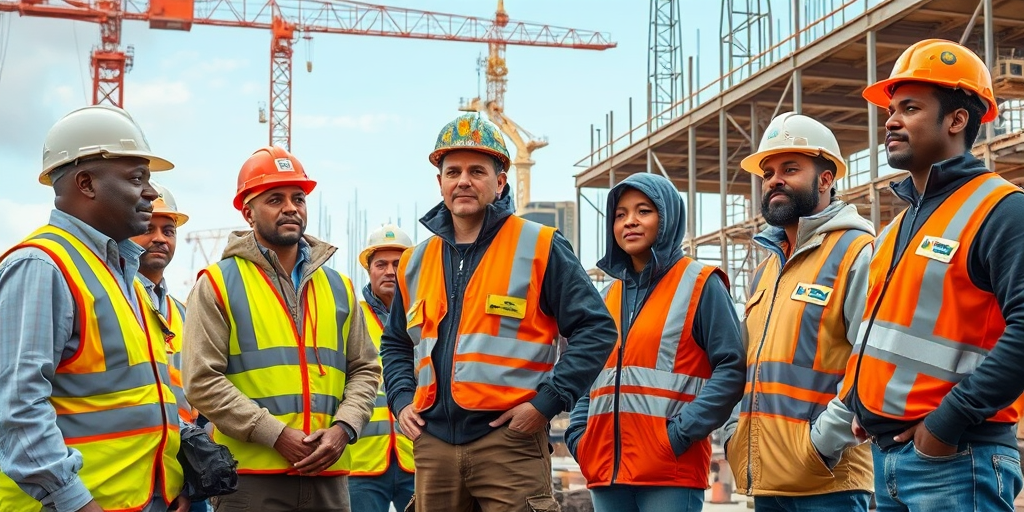Construction Industry Resilient Amid DEI Scrutiny: Focus on Inclusive Recruitment
In the midst of a national reevaluation of diversity, equity, and inclusion (DEI) initiatives under the Trump administration, the construction industry stands firm in its commitment to inclusivity. The annual Construction Inclusion Week, to be held from October 13 to 17 in 2025, offers a beacon of progress amidst a polarized political climate. Aimed at addressing labor shortages, this event distinguishes itself by promoting diversity without specifically targeting any group, as top industry leaders, including Turner Construction, emphasize the necessity of inclusion for workforce expansion.
Backdrop of Political Changes
The backdrop to this initiative is a significant shift in federal policy following a newly enacted executive order by President Donald Trump. This order, characterized by the administration as a move against “radical and wasteful” DEI measures, aims to dismantle such programs within both governmental and private sectors. Consequently, agencies like the Department of Transportation have ceased to enforce race and gender-based inclusion rules in specific programs.
Despite this pushback, the construction sector intends to press ahead with inclusive practices, a stance that Abrar Sheriff, president of Turner Construction, finds indispensable. Sheriff underscores the industry’s urgent need to hire approximately half a million workers for the growing number of nationwide projects. This push for inclusion comes not from political motivation but rather from a practical necessity to attract capable talent from all societal segments, ensuring a diverse, robust workforce.
Local Impact: A Welcome Recruitment Strategy
The decision to uphold Construction Inclusion Week without focusing on specific demographic groups reflects a strategy of openness that local construction firms hope will resonate throughout communities in the United States. The continued advocacy for an inclusive environment promises to not only meet labor market demands but also facilitate a broader acceptance of diverse cultural and social backgrounds—crucial in regions like the United States experiencing demographic shifts.
Local expert, Linda Gonzalez, a labor analyst based in Austin, highlights the importance of the event. “The initiative by major construction firms to create a welcoming environment for all potential workers sends a strong message, one that prioritizes practical workforce needs over divisive politics,” she stated.
Resources for Small Contractors
A distinctive feature of this year’s Construction Inclusion Week is its focus on small to mid-sized contracting businesses. Turner Construction and its partners plan to offer these companies free resources and blueprints designed to foster an inclusive work environment. These resources aim to alleviate the financial and logistical challenges smaller firms face when trying to implement comprehensive inclusion strategies. By equipping these firms with ready-to-use content, the construction industry seeks to shield them from possible backlash while still promoting the benefits of an inclusive workforce.
John Davis, owner of a small construction firm in Dallas, heartily endorses the shared resources. “Having access to tools and frameworks crafted by top industry leaders means I can focus on building a welcoming company culture without exorbitant expenses,” he remarked. “It brings immediate value to our firm and enables us to compete for talent on a more equal footing.”
Looking Ahead: Potential Implications
The ongoing commitment to Construction Inclusion Week serves as a litmus test for how industries can navigate tricky political landscapes while keeping community and business needs at the forefront. It hints at a future where inclusion strategies are evaluated based on effectiveness rather than political alignment.
Proponents see this integrity-driven approach as a sustainable model for long-term economic and social gains, particularly in regions with labor shortages. However, they also caution the industry to remain vigilant about aligning practices with evolving legal guidelines, to avoid any unintentional breaches in compliance.
Perspectives on the Ground
While industry leaders and policy advocates remain optimistic, some community members express cautious approval. Local grassroots organizer Michele Thomas raises some concerns, stating that “While the industry’s inclusivity efforts are commendable, they must be matched by a transparent commitment to fair labor practices across all tiers of employment.”
As discussions continue to unfold, community members seek assurance that the momentum gathered by the construction industry serves the broader purpose of fair employment and ethical business practices.
For local residents interested in participating or learning more about Construction Inclusion Week, a series of webinars and workshops are planned. These will serve as platforms where citizens can engage directly with industry stakeholders. Interested parties are encouraged to contact local government offices or industry trade groups for further information.
Ultimately, as the 2025 Construction Inclusion Week approaches, it stands as a testament to the construction industry’s resilience and adaptability amidst a backdrop of shifting political currents. By championing diversity and inclusion, industry leaders are not only addressing immediate workforce challenges but also securing a stable and enduring foundation for the future.







